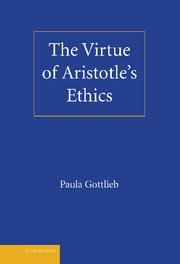Book contents
- Frontmatter
- Contents
- Preface and Acknowledgments
- Abbreviations
- Introduction
- PART I ETHICAL VIRTUE
- 1 Virtue in the Mean
- 2 Nameless Virtues
- 3 The Non-remedial Nature of the Virtues
- 4 Listing the Virtues
- 5 Uniting the Virtues
- PART II ETHICAL REASONING
- Conclusion
- Appendix: Uniting the “Large-scale” Virtues
- Select Bibliography
- Index
4 - Listing the Virtues
Published online by Cambridge University Press: 29 September 2009
- Frontmatter
- Contents
- Preface and Acknowledgments
- Abbreviations
- Introduction
- PART I ETHICAL VIRTUE
- 1 Virtue in the Mean
- 2 Nameless Virtues
- 3 The Non-remedial Nature of the Virtues
- 4 Listing the Virtues
- 5 Uniting the Virtues
- PART II ETHICAL REASONING
- Conclusion
- Appendix: Uniting the “Large-scale” Virtues
- Select Bibliography
- Index
Summary
In his Nicomachean Ethics, Aristotle lists the following dispositions as ethical virtues: bravery, temperance, generosity, magnificence, magnanimity, a virtue concerned with honour on a small scale, mildness, truthfulness, wit, and friendliness. As we have seen, the first five are named, the second five are nameless. These are followed by justice and equity. The list is interesting both for what is included and for what is omitted. For example, Aristotle thinks that wit and friendliness are virtues. Kant does not. Aristotle treats pusillanimity as a vice, but it is treated as an important virtue by one modern Utilitarian. Hope, not on Aristotle's list, is often considered to be an important virtue, and Aristotle is frequently chided for omitting charity and benevolence. Asceticism, meekness, and self-sacrifice, Aristotelian vices, are often touted as virtues. On a more popular note, self-discipline tops William Bennett's infl uential list, and faith is important too. These are not virtues according to Aristotle. Followers of Ayn Rand praise greed, making and keeping money, and self-assertion. Others yet again praise sympathy or compassion, and tolerance. Yet others talk of environmental virtues.
Given the possible candidates for virtues, it is important to consider the basis for Aristotle's list if we are to see how he would rule out or rule in the modern suggestions about what the ethical virtues are. In Chapter 2, I argued that the existence of Aristotle's nameless virtues contradicts the influential idea that the basis for Aristotle's list is simply the views of his time, and therefore that the list is generated in a very conservative fashion.
- Type
- Chapter
- Information
- The Virtue of Aristotle's Ethics , pp. 73 - 91Publisher: Cambridge University PressPrint publication year: 2009

